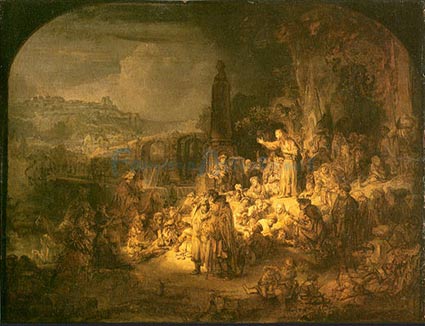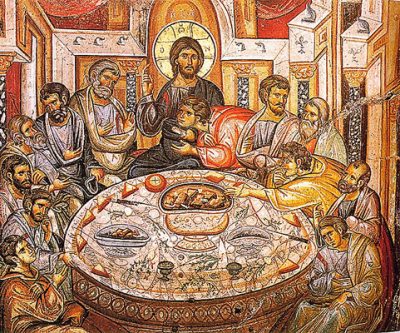Liturgical Readings for : Wednesday, 17th April, 2024
Wednesday in the Third Week of Easter
The persecution of the church in Jerusalem under Paul sends the Christians to preach the gospel elsewhere.
FIRST READING
A reading from the Acts of the Apostles 8:1-8
They went from place to place preaching the Good News.
That day a bitter persecution started against the church in Jerusalem, and everyone except the apostles fled to the country districts of Judaea and Samaria.
There were some devout people, however, who buried Stephen and made great mourning for him. Saul then worked for the total destruction of the Church; he went from house to house arresting both men and women and sending them to prison.

Those who had escaped went from place to place preaching the Good News. One of them was Philip who went to a Samaritan town and proclaimed the Christ to them. The people united in welcoming the message Philip preached, either because they had heard of the miracles he worked or because they saw them for themselves. There were, for example, unclean spirits that came shrieking out of many who were possessed, and several paralytics and cripples were cured. As a result there was great rejoicing in that town.
The Word of the Lord. Thanks be to God
Responsorial Psalm Ps 65
Response Cry out with joy to God all the earth.
Or Alleluia!
1. Cry out with joy to God all the earth, O sing to the glory of his name.
O render him glorious praise. Say to God: ‘How tremendous your deeds!’ Response
2. ‘Before you all the earth shall bow; shall sing to you, sing to your name.’
Come and see the works of God, tremendous his deeds among men. Response
3. He turned the sea into dry land, they passed through the river dry-shod.
Let our joy then be in him; he rules for ever by his might. Response
Gospel Acclamation Jn 10: 27
Alleluia, Alleluia!
The sheep that belong to me listen to my voice, says the Lord;
I know them and they follow me.
Alleluia!
or Jn 6:40
Alleluia, Alleluia!
It is my Father’s will, says the Lord, that whoever believes
the Son shall have eternal life, and that I shall raise him up on the last day.
Alleluia!
GOSPEL

The Lord be with you. And with your spirit
A reading from the holy Gospel according to John 6:35-40 Glory to you, O Lord
It is my Father’s will that whoever sees the Son shall have eternal life.
Jesus said to the crowd:
‘I am the bread of life. He who comes to me will never be hungry;
he who believes in me will never thirst.
But, as I have told you, you can see me and still you do not believe.
All that the Father gives me will come to me, and whoever comes to me
I shall not turn him away; because I have come from heaven,
not to do my own will, but to do the will of the one who sent me.
Now the will of him who sent me is that I should lose nothing of all that he has given to me, and that I should raise it up on the last day.
Yes, it is my Father’s will that whoever sees the Son and believes in him shall have eternal life, and that I shall raise him up on the last day.’
The Gospel of the Lord. Praise to you, Lord Jesus Christ.
**************************
Gospel Reflection Wednesday Third Week of Easter John 6:35-40
In Luke’s gospel, Jesus had tried to preach the gospel to a Samaritan village, but the Samaritans rejected him. In Luke’s second volume, the Acts of the Apostles, the risen Lord preaches the gospel again to the Samaritans through Philip, as described in our first reading, and on this occasion the Samaritans ‘united in welcoming the message Philip preached’. The Lord does not take an initial ‘no’ to him as final. He continues to offer the gospel to those who initially reject it. In today’s gospel reading Jesus declares, ‘Whoever comes to me, I shall not turn away’. Even though we may have turned away from him in the past, he does not turn away from us. If we come to him, having initially turned away, he will not turn us away because, as he declares in the gospel reading, it is his Father’s will that ‘whoever sees the Son and believes in him shall have eternal life’. There is a time for every matter under heaven, according to the Book of Ecclesiastes.
According to Luke, the public ministry of Jesus wasn’t the time for the Samaritans to respond to the gospel (contrary to the gospel of John!) but the preaching of Philip in the period after Pentecost was that time. Like the father in the parable of the prodigal son, the Lord knows how to wait on us. Although his time is always ‘now’, he is prepared to wait on our timing, just as he waited on the timing of Saul who, according to our first reading, ‘worked for the total destruction of the church’ before becoming the great apostle to the pagans in response to the Lord’s call.
________________________________
The Scripture Readings are taken from The Jerusalem Bible, published 1966 by Darton, Longman & Todd Ltd












